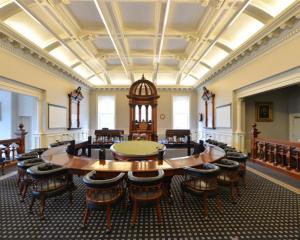Carisbrook should be sold outright, but with a ban on any future big-box retail development at the site to protect nearby South Dunedin retailers, a Dunedin City Council report has recommended.
Councillors will this week consider the staff report, by council policy analyst Tami Sargeant, which recommends the sale of the properties, including the historic rugby ground, as soon as practicable.
A restrictive covenant should be placed on the site's certificate of title, preventing any future retail development to protect the integrity of South Dunedin's existing retail area, located about 800m away, the report said.
New Zealand Historic Places Trust conditions designed to protect heritage elements of the stadium should also be included, the report said.
The suggestion has been criticised by resource management consultant Don Anderson, of Dunedin, who was one of those to argue Carisbrook should be retained as a multi-use sporting venue for South Dunedin.
He told the Otago Daily Times yesterday he had been asked by former mayor Peter Chin to outline his vision for the site at a meeting at the stadium last year, only for his suggestion to be dismissed by council staff.
He questioned the demand for industrial land in the area, and said the report's recommendations were "absolutely" a missed opportunity for the area.
"The staff are misguided.
They failed to appreciate ... the importance of Carisbrook as the South Dunedin equivalent of Logan Park.
"I think staff have failed to appreciate the opportunity."
The recommendations - to be considered at this week's 2011-12 pre-draft annual plan hearings - come after the council purchased the ground, neighbouring houses and an adjacent car park from the Otago Rugby Football Union for $7 million in 2009.
Public consultation that followed identified a host of possible uses for the properties, leading to three options being shortlisted for consideration by the new council as part of this year's annual plan process.
The shortlisted options were to sell the sites under existing industrial zoning, or as a retirement village, or to develop the site as an industrial park, possibly as a public-private partnership, the report said.
Those options scored best against the council's "agreed criteria" of costs, contribution to community outcomes, stakeholder and environmental impacts, risk and strategic fit, the report said.
The proposal to retain Carisbrook as a multi-use sports facility was considered, but did not meet the criteria, the report said.
A separate report examining South Dunedin's sporting needs identified demand for parks, not sports grounds, and industrial land beside Carisbrook meant it would not suit a "tranquil reserve space".
The cost of redeveloping Carisbrook into a multi-use sporting hub was "considered greater than the resulting community benefit", the report said.
The council needed to confirm the future of the site by the time the Otago Rugby Football Union vacated the ground on October 1.
After that date, with no rent from tenants, the council would begin to incur holding costs of about $440,000 each year.
Plans for the stadium were considered separately from the eight nearby properties, which it was expected could be sold later this month.
Tenders for the seven industrially-zoned houses and a shed, which together had a rateable value of over $1 million, closed last month and were being assessed, council property assistant manager Rhonda Abercrombie said last week.
The staff report recommending the sale of Carisbrook would be discussed by councillors at this week's two-day 2011-12 pre-draft annual plan hearing, which begins on Thursday.
The public would have a further chance to have their say as part of annual plan consultation in May.
Mr Anderson said, depending on the outcome of council deliberations, he would make a further submission to the May hearing.












